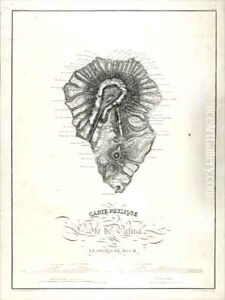Leopold de Buch Paintings
Leopold von Buch was not an artist in the traditional sense of a painter or sculptor, but rather a distinguished German geologist and paleontologist. Born on April 26, 1774, in Stolpe an der Oder in the Kingdom of Prussia (now part of Poland), his full name was Christian Leopold von Buch. He was known for his significant contributions to geology, particularly in volcanic geology, stratigraphy, and paleontology.
Von Buch studied at the Freiberg Mining Academy under the tutelage of the famous geologist Abraham Gottlob Werner, one of the most influential figures in the field of geology during the late 18th century. Werner's theories, especially Neptunism, which posited that rocks formed from the crystallization of minerals in the early Earth's oceans, initially influenced Von Buch. However, as his career progressed, he started to question Werner's ideas and eventually became a proponent of Plutonism, which attributes the formation of certain rocks to igneous origins.
His travels across Europe, including to the volcanic regions of Italy, the Canary Islands, and Scandinavia, were pivotal in his development of geological theories. Von Buch's observations of the structure and formation of volcanic craters led to his development of the theory of 'craters of elevation'. He also made important contributions to understanding the stratigraphy of the Alps and the Jura Mountains, and he was one of the first to propose that the Alps were formed by massive earth movements rather than by the processes described by Neptunism.
Leopold von Buch was also renowned for his work in paleontology. He described several fossils in his writings and made significant contributions to the use of fossils in stratigraphic geology, which is the study of rock layers (strata) and layering (stratification). His work in this area helped to lay the groundwork for biostratigraphy, which involves dating and correlating rock strata by using the fossils contained within them.
Leopold von Buch never married and dedicated his life to science. He was a member of various scientific societies, including the prestigious Prussian Academy of Sciences. He maintained correspondence with many of the leading scientists of his time and influenced the next generation of geologists. Von Buch's legacy in the field of geology is significant, and he is remembered as one of the early geologists who helped to develop a modern understanding of earth sciences. He passed away on March 4, 1853, in Berlin.
